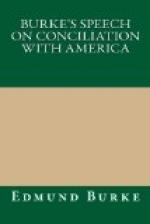[Footnote: 20. complexions. “Mislike me not for my complexion.”—M. V. Is the word used in the same sense by Burke?]
[Footnote: 21. the thunder of the state. What is the classical allusion?]
[Footnote: 22. a nation is not governed.
“Who overcomes
By force hath overcome but half his foe”
—Paradise
Lost, 1, 648, 649.]
[Footnote: 23. Our ancient indulgence. “The wise and salutary neglect,” which Burke has just mentioned, was the result of (a) the struggle of Charles I. with Parliament, (b) the confusion and readjustment at the Restoration, (c) the Revolution of 1688, (d) the attitude of France in favoring the cause of the Stuarts, (e) the ascendency of the Whigs. England had her hands full in attending to affairs at home. As a result of this the colonies were practically their own masters in matters of government. Also the political party known as the Whigs had its origin shortly before William and Mary ascended the throne. This party favored the colonies and respected their ideas of liberty and government.]
[Footnote: 24. great contests. One instance of this is Magna Charta. Suggest others.]
[Footnote: 25. Freedom is to them Such keen analysis and subtle reasoning is characteristic of Burke It is this tendency that justifies some of his admirers in calling him “Philosopher Statesman”. Consider his thought attentively and determine whether or not his argument is entirely sound. Is he correct in speaking of our Gothic ancestors?]
[Footnote: 26. Abeunt studia in mores. Studies become a part of character.]
[Footnote: 27. winged ministers of vengeance. A figure suggested perhaps by Horace, Odes, Bk. IV., 4: “Ministrum fulmims alitem”—the thunder’s winged messenger.]
[Footnote: 28. the circulation. The Conciliation, as all of Burke’s writings, is rich in such figurative expressions. In every instance the student should discover the source of the figure and determine definitely whether or not his author is accurate and suggestive.]
[Footnote: 29. its imperfections.
“But sent to my
account
With all my imperfections
upon my head.”
—Hamlet,
I, v, 78, 79.]
[Footnote: 30. same plan. The act referred to, known as the Regulating Act, became a law May 10, 1774. It provided (a) that the council, or the higher branch of the legislature, should be appointed by the Crown (the popular assemblies had previously selected the members of the council); (b) that officers of the common courts should be chosen by the royal governors, and (c) that public meetings (except for elections) should not be held without the sanction of the king. These measures were practically ignored. By means of circular letters the colonies were fully instructed through their representatives. As a direct result of the Regulating Act, along with other high-handed proceedings of the same sort, delegates were secretly appointed for the Continental Congress on Sept. 1 at Philadelphia. The delegates from Massachusetts were Samuel Adams, John Adams, Robert Paine, and Thomas Cushing.]




